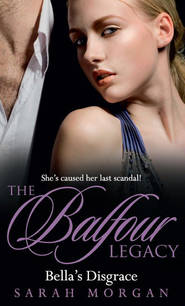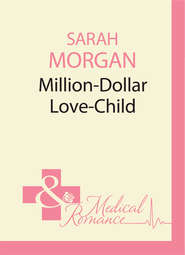По всем вопросам обращайтесь на: info@litportal.ru
(©) 2003-2024.
✖
St Piran's: Prince on the Children's Ward
Автор
Год написания книги
2019
Настройки чтения
Размер шрифта
Высота строк
Поля
Home.
‘So, what brings you banging on my door at this unearthly hour—what have you done?’ Josh sounded distracted. ‘Please tell me you haven’t killed a patient.’
‘No!’ Outrage was sharp and hot, slicing through the last of her composure. ‘Far from it. I saved a patient. Two patients, actually.’ Tasha clenched her fists, horrified to realise just how badly she needed someone else to tell her she’d done the right thing. That she hadn’t blown her career on a childish whim. ‘I had an incident—sort of. You know when you just have a feeling about a patient? Perhaps you haven’t actually had test results back from the lab, but sometimes you don’t need tests to tell you what you already know. Well, I had one of my feelings—a really strong feeling. I know it wasn’t exactly the way to go about things, but—’
‘Tasha, I’m too tired to wade through hours of female waffle. Just tell me what you’ve done. Facts.’
‘I’m not waffling. Medicine isn’t always black and white. You should know that.’ Tasha’s voice was fierce as she told him about the twins, the decisions she’d made and the drug she’d used.
Josh listened and questioned her. ‘You didn’t wait for the results of the blood cultures? And if it wasn’t on the hospitalapproved formulary—’
‘They had it in stock for a different indication. You remember I went to the conference of the American Academy of Pediatrics last year? I told you about it when we met for supper that night. The data is so strong, Josh. We should be using it in Britain, but it’s all money, money, money—’
‘Welcome to the reality of health-care provision.’
‘The drug is at least fifty per cent more effective than the one I was supposed to use.’
‘And three hundred per cent more expensive.’
‘Because it’s good,’ Tasha snapped, ‘and research of that quality comes at a price.’
‘Don’t lecture me on the economics of drug development.’
‘Then don’t lecture me on wanting to do the best for my patients. Those babies would have died, Josh! If I’d waited for the results or used a different drug, they would have died.’ In her head she saw their tiny bodies as they lay with the life draining out of them. She heard their mother’s heartbreaking sobs and saw the father, white faced and stoical, trying to be a rock while his world fell apart. And she saw herself, facing the most difficult decision of her professional life. ‘They lived.’ She felt wrung out. Exhausted. But telling her brother had somehow made everything clearer. Whatever happened to her, whatever the future held, it had been worth the price. She didn’t need anyone else to tell her that.
‘The drug worked?’
‘Like magic.’ The scientist in her woke up and excitement fizzed through her veins. ‘It could transform the management of neonatal sepsis.’
‘Have you written it up for one of the journals?’
‘I’m going to. I just need to find the time.’ And now she had time, she thought gloomily. Oodles of it.
‘But the hospital authorities didn’t approve and now you’re in trouble?’
‘I didn’t exactly follow protocol, that’s true, but I’d do the same thing again in the same circumstances. Unfortunately, my boss didn’t agree.’ Tasha turned her head and stared out of the window. ‘Which is why I resigned.’ Saying the word made her heart plummet. It sounded so—final.
‘You did what?’ Josh sounded appalled. ‘Please tell me you’re kidding.’
‘No. I resigned on principle.’ The anger rose, as fresh and raw as it had been on that morning when she’d faced her boss after two nights without sleep. ‘I said to him, What sort of department are you running when your budget comes before a baby’s life?‘
‘And no doubt you went on to tell him what sort of department he was running. Tactful, Tasha.’ Josh rubbed his hand over his jaw. ‘So you questioned his professional judgement and dented his ego.’
‘A man of his position shouldn’t need to have his ego protected. He shouldn’t be that pathetic.’
‘Did you tell him that as well?’
‘I told him the truth.’
Josh winced. ‘So … I’m assuming, given that he was the sort of guy to protect his ego, that he didn’t take it well?’
‘He’s the sort of person who would stand and watch someone drown if health and safety hadn’t approved a procedure for saving them. He said the manufacturer did not present a sufficiently robust economic analysis.’ Tasha felt the emotion rush down on her and forced herself to breathe. ‘So then I asked him if he was going to be the one who told the parents they’d lost both their babies because some idiot in a suit sitting behind his desk had crunched the numbers and didn’t think their children’s lives were worth the money.’
Josh closed his eyes briefly. ‘Tasha—’
‘Sorry.’ The lump in her throat was back and this time it wasn’t going anywhere. ‘I know I should have been unemotional about the whole thing but I just can’t be. Honestly, I’m steaming mad.’
‘You don’t say? Are you about to cry on me?’
‘No, absolutely not.’
‘The only time I’ve ever seen you cry was when Cheapskate died.’
They shared a look. Cheapskate had been the dog their mother had bought after their father had walked out. Tasha remembered hugging his warm body and feeling his tail thumping against her leg. She remembered thinking, Don’t ever leave me, and then being devastated when he’d done just that.
‘He was a great dog.’
‘He was a lunatic.’ But Josh’s eyes were gentle. ‘Tell me about those babies you saved. Are they still doing well?’
‘Discharged home. You should have seen it, Josh. You know what it’s like, trying to calculate these paediatric doses—they never have trial data in the right age of child, but this …’ She smiled, the doctor in her triumphant. ‘It’s why I trained. To push boundaries. To save a life.’
‘And you saved two.’
‘And lost my job.’
‘You shouldn’t have resigned.’
It was a question she’d asked herself over and over again. ‘I couldn’t work with the man a moment longer. He was the sort who thought women should be nurses, not doctors.
Basically he’s a—a—’ She bit off the word and Josh gave a faint smile.
‘I get the picture. Has it occurred to you that you might be too idealistic, Tasha?’
‘No. Not too idealistic.’ The conviction came from deep inside her. ‘Isn’t that why we’re doctors? So that we can push things forward? If we all did what doctors have always done and no more, we wouldn’t have progress.’
‘There are systems—’
‘And what if those systems are wrong? I can’t work for someone like that. Sooner or later I would have had to inject him with something seriously toxic …’ Tasha gave a cheeky smile ‘… but first I would, of course, have made sure it was approved by the formulary committee.’
‘You’re incorrigible.’
‘No, I’m a doctor. I can accept that there are some patients I can’t help. What I can’t accept is that there are some patients I’m not allowed to help because someone has decided the treatment is too expensive! I mean, who decides what’s important?’ Tasha paced across his office, her head swirling with the same arguments that had tormented her for weeks. ‘I told him that if the chief executive took a pay cut we’d be able to easily fund this drug for the few babies likely to need it.’
‘I’m beginning to see why you felt the need to resign.’
‘Well, what would you have done?’
‘I have no idea.’ Her brother spread his hands. ‘It’s impossible to say if you’re not in that situation. Why didn’t you wait for the blood cultures? Or use the first-line choice?’











